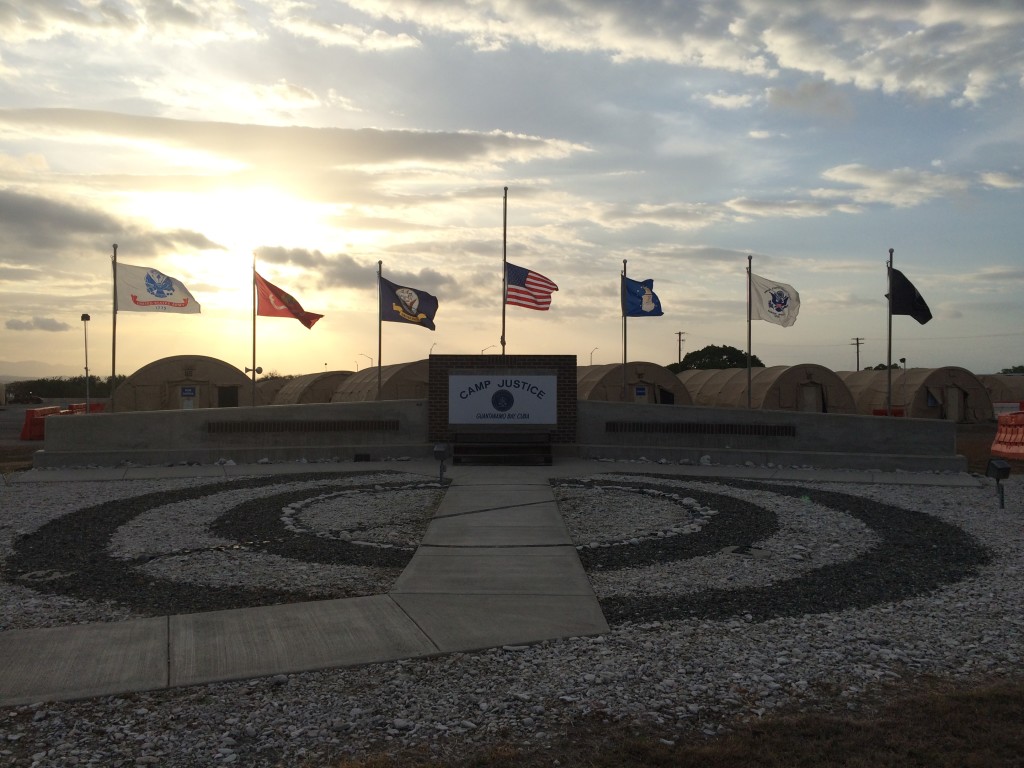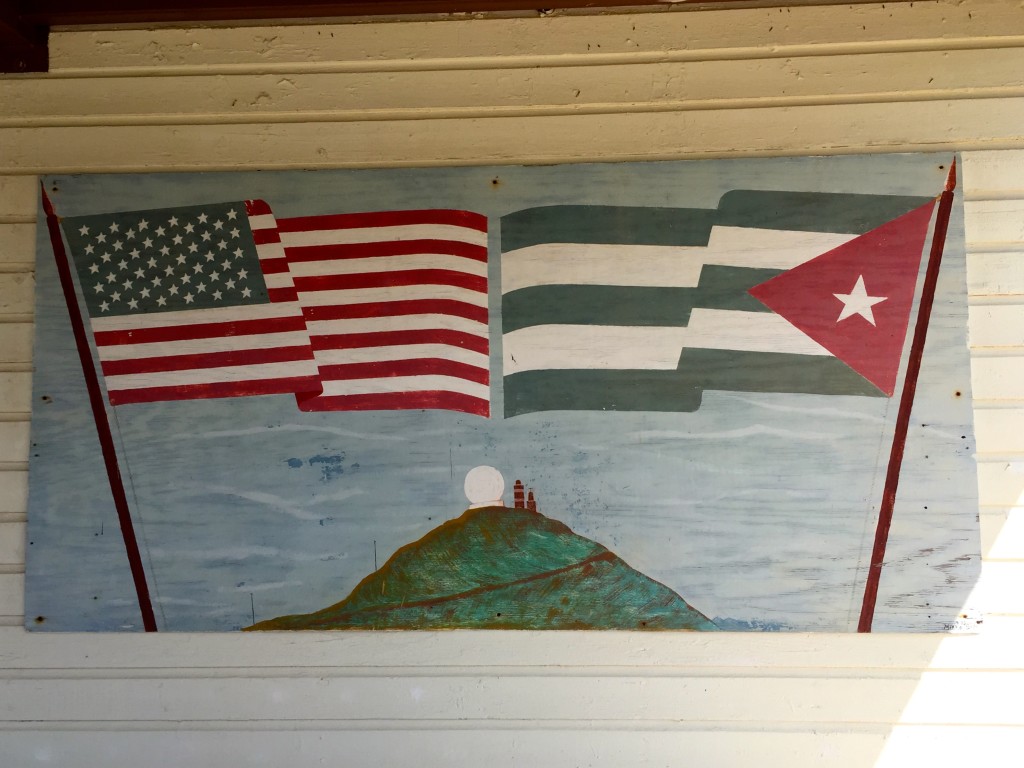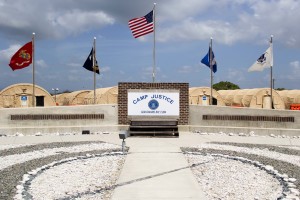NAVAL STATION GUANTANAMO BAY, CUBA – The U.S. may have opened an embassy in Havana, Cuba, but 500 miles away at the Guantanamo Bay naval base you wouldn’t know that anything had changed.
Guantanamo Bay, with its small-town feel, is a major naval base as well as home to the infamous detention center for captives in the war on terror. Since the reestablishment of diplomatic relations between the U.S. and Cuba, operations have continued on as usual, with no plans to change. In fact, experts say closing the base would take decades. Meanwhile, the gift shop still has Fidel Castro bobble heads for sale.
“There is no impact on the base at this point,” said Kelly Wirfel, the public affairs officer for the Naval Station Guantanamo Bay. “We are continuing to execute our mission here.”
In essence, the naval base is an island within the island, separated from Cuba and relatively unaffected by changes in diplomatic relations. Whatever changes are going on in Washington and Havana, daily life doesn’t show any signs of changing yet. Global Post spent a week on the base finding out how the historic diplomatic shift would affect residents’ lives.
At Radio GTMO, the local radio station, the maxim is “Rockin’ in Fidel’s Backyard,” and there are no plans to alter it. The $25 Fidel Castro bobbleheads for sale in the radio’s gift shop aren’t going away anytime soon — the sailors running the station just placed a new order. The North East Gate, which used to allow travel to and from Cuba, will remain closed, and the mines surrounding the base will stay in the ground.
“As the US and Cuba normalize relations, two big Cuban demands remain: ending the embargo and giving back Guantanamo,” said Shannon O’Neil, a senior fellow at the Council on Foreign Relations. “Neither is likely before the 2016 presidential election, given the Republican field and the role Congress must play.”
But she stressed that the challenges to the Obama administration’s attempts to close the military prison are likely only a short-term hurdle.
“In a post-Castro brothers’ Cuba, negotiations to return the territory are possible and even likely, with precedents around the world,” O’Neil said. She pointed to the transfer of the Panama Canal from US control to Panamanian control as an example; that transition took more than 20 years.
The 45 square miles of land occupied by the Guantanamo Bay base have been leased from Cuba since 1903. The original lease agreement gave the land to the US “for the time required,” which effectively means the US can take its sweet time leaving. The US pays just over $4,000 a year in rent, though the Castros still refuse to cash the checks, because that would serve to legitimize the current occupation of Guantanamo. The Cuban embassy did not return calls about whether the Cuban government planned to start cashing the checks.
In January 1961, shortly before John F. Kennedy was inaugurated, President Dwight Eisenhower severed diplomatic relations as Fidel Castro declared himself in favor of Marxist ideology and began mass jailings and executions of Cuban dissidents. Then, in 1964, Castro cut off the water supply, forcing the base to become completely self-sufficient.
Guantanamo Bay is first and foremost a naval base, in operation since the land was acquired over a century ago. It has docks capable of accommodating ships as large as a small aircraft carrier, and facilities catering to the families of soldiers stationed at the base.
“We’re a logistical hub so lots of the ships that are doing operations in the Caribbean pull in here to be refueled, resupplied, whatever it is that they might need,” Wirfel said. The base has also supported humanitarian missions, such as taking in a massive influx of Haitian refugees and migrants in the early 1990s as a part of Operation Sea Signal.
Twenty years later, all but 28 of the refugees have left. The base is home to a mix of service members and their families, civilians, and third-country nationals, mostly Jamaicans and Filipinos who come to the base for work.
In total, nearly 4,000 people live on the base, including more than 500 spouses and children.
The naval base has the feel of a humid small town that could be anywhere on the Gulf Coast. There’s McDonalds, Pizza Hut, and Taco Bell. The local high school’s team name is the Pirates. There is a movie playing every night but Wednesday at the Lyceum, a stadium-style outdoor theater, complete with a concession stand that sells popcorn, hot dogs, and soft drinks for a dollar each.
The movie theater is where you will find Jose Polics, 18, many nights of the week. He has lived in Guantanamo Bay his entire life. “It’s a wonderful experience,” said Polica. “The best part is that the Gitmo community has treated me so nice.”
Polica recently graduated from W.T. Sampson High School, the only one on the base. He graduated with only a handful of other students. Though he says he is interested in going into a job having to do with IT, he has no desire to leave the base. “I consider Gitmo my home,” he said.
The hippest place to be each night is the Jerk House, a Jamaican restaurant that offers the most highly coveted service for most residents of Guantanamo Bay: Wi-Fi.
The base is notorious for its terrible and outrageously expensive internet service. Visiting journalists pay $150 per week for just one hardwire hook-up with connectivity speeds that are reminiscent of pre-broadband days.
Like moths to a streetlight, the free Wi-Fi creates a melting pot of the community outside the Jerk House. In one evening reporters were joined by a crew of FBI witnesses who were scheduled to testify in an on going military commission.
“It’s my first time here,” said one of the witnesses who had helped collect evidence overseas. The team was sporting sunburns and raving about their time on the beach.
Nearby, at the officer’s club, an IT technician joined a table full of reporters. He said that he comes down to Guantanamo about once a month from Virginia Beach to help broadcast the military commissions to viewing rooms on military bases stateside. He has a couple of boats in the marina and offered to take the group sailing on one of the many down days that come with reporting on the base.
For most, entertainment can be hard to come by in the isolated naval base. The Morale, Welfare, and Recreation Department tries to solve this problem. The organization makes sure there is something to do each day of the week, from kayaking to a “South of the Border” celebration, featuring an adolescent mariachi band flown in from nearby Florida.
Despite all the programming, residents of the base tend to get island fever.
Wouldn’t it be nice if they could take a nice little trip to Cuba?
“I think the consensus is that everyone here would love that. But there is no talk of that, and if it does happen, it will certainly be sometime down the road,” Wirfel said. “I hope I’m here for that.”
There are two sides to Guantanamo. On one side is a regular naval base whose mission is “to guarantee the success of a myriad of strategic operations by providing exemplary support to our tenants, government agencies, and allies,” Wirfel said. On the other side are the notorious Guantanamo Bay detention camps. Separating them are roadblocks and barriers manned by armed guards.
One of the few things the two sides have in common is the 17-mile border they share with Cuba.
A barbed-wire fence and a minefield surround the base. Marines are posted at watchtowers 24 hours a day. Even the local radio station is designed not to broadcast past the border of the base.
But the edge of the base is not completely impermeable.
Since 1995, high-ranking military personnel from each side have held monthly “fence-line meetings.” The site of the meeting alternates, one month in an old Marine barracks on the US side, the next month in a beat-up Cuban customs house.
“The captain of the base, Captain (David) Culpepper, meets with the Cuban Frontier Brigade, which is their equivalent to the military on that side,” Wirfel said. “It’s a very professional meeting. There is never anything political talked about. It’s all administrative in matter.”
The goal of the meetings is to keep the border peaceful. Neither side wants an inadvertent flare-up from a misunderstanding.
“As you can imagine, when you have guards standing on the fence line face-to-face with each other, it’s important that there’s some communication as to what’s happening on our side and what’s happening on your side,” said Wirfel. The reestablishment of diplomatic relations, Wirfel said, would not affect the monthly meetings, which have been going on for 20 years.
In addition to the monthly get-togethers, there is a surprising annual joint military effort at cooperation between two countries that have not gotten along for decades.
“Every year we also do a bilateral exercise with them,” Wirfel said. This year they cooperated to fight an imaginary fire on the fence line. The participants jumped back and forth across the heavily guarded border, at one point carrying a person with a simulated injury across the border into enemy territory.
A short drive away, less than five miles from the naval docks, sits a side of Guantanamo Bay that reminds visitors and service members that this is a deployment site rather than a traditional military base.
Following 9/11, the Department of Defense decided to begin using the base as a detention center for those captured overseas in the newly declared War on Terror.
On Jan. 11, 2002, the first 20 detainees arrived at Camp X-Ray, a facility made up of chain-link enclosures that resembled dog cages more than jail cells. Since then, there have been several new detention facilities constructed, a few of which resemble standard federal correction lock-ups. In total, more than 780 detainees have passed through the island-based detention center. Today, 116 remain.
Many of the guards who work in the detention centers are military police and live in long canvas tents that look like massive drainage pipes sliced in half. The oceanside tents are kept heavily air-conditioned to dissuade the local iguanas and banana rats from seeking shelter during the blistering-hot days.
Not even a mile down the road is Camp Delta, home to the people allegedly responsible for orchestrating the greatest terrorist attack ever on American soil. This prison is effectively an island within Guantanamo, which itself is an island of US control on the island of Cuba.
The Joint Task Force, with members from all four branches of the US military, runs the detention center. The group in charge is called Joint Task Force Guantanamo (JTF Guantanamo. On its website, the mission is clear: “JTF Guantanamo conducts safe, humane, legal, and transparent care and custody of detainees, including those convicted by military commission.”
That mission remains unchanged, regardless of the reestablished diplomatic relations between the US and Cuba.
“Nothing has changed for us,” said Captain Chris Scholl, public affairs officer for JTF Guantanamo. “It is business as usual.”
In the end, it may be far too much to expect instantaneous changes at Guantanamo. The base acts a tidal pool, collecting debris and detritus from more than a century of history: the Spanish-American War, the US colonial period, the Cuban Revolution, the Cold War, and now the aftermath of 9/11 and the “Global War on Terror.” Yet at the same time, the tortured politics surrounding Guantanamo have given rise to a relic; a fossilized collection of odd legal, political, and cultural circumstances that the world is unlikely to see again.













